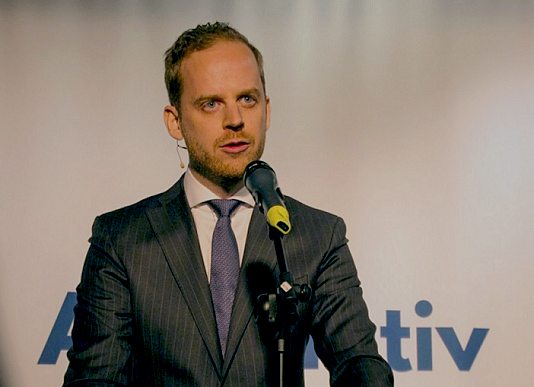Many thanks to LN for translating this essay from Fria Tider.

Help Us. Help Sweden.
[Photo caption: Alternative for Sweden’s ambition is to become part of a kind of nationalist international, writes Gustav Kasselstrand.]
“Therefore, AFS seeks support from Trump followers in the United States”
by Gustav Kasselstrand
March 20, 2018
Alternative for Sweden is a new movement for a new era. Today, we are the first Swedish party ever to launch an international fundraising campaign on the Internet, writes party leader Gustav Kasselstrand.
Currently, the political map is redrawn throughout the Western world, the traditional right-to-left axis diminishes in importance, as do the parties that for decades have defined it. In its place new conflicts emerge. Conflicts that do not primarily concern how different social classes should advance at each other’s expense, but who can represent the people before the establishment, freedom of expression before political correctness, and the nation before globalism. This is the new game plan, which the established parties have had terrible difficulty adapting to. U-turns have been shown to be difficult in politics.
Established parties who, in the eleventh hour, try to piggyback on disruptive newcomers, rarely manage their repositioning. Drowsy, they venture into unknown terrain, often seeing their credibility drop further.
The party structures are too chewy: bloated by successes in the 20th century, the insight into their own instability becomes too difficult and painful. They finally will become aware of this in an abrupt manner.
[Sebastian] Kurz in Austria and [Emmanuel] Macron in France are perhaps the clearest examples of how the established parties are challenged not only by outsiders like [Heinz-Christian] Strache and [Marine] Le Pen, but also from within, by people who have seen new opportunities in a new era.
In Britain and the United States they have tasted victory’s sweetness in the form of Brexit and Donald Trump’s triumph in the presidential election.
The trends are clear: successes for new, energetic contenders; established parties’ craving for yesteryear.
When media and established politicians judged against Trump’s election campaign, anti-establishment politicians all over the world from the very first moment chose to learn from it.
It shows that modern nationalism at one and the same time is both a national struggle and a global democratic revolution. While there are many political achievements to be enjoyed in the Western world, there is also a deep seriousness behind all that happens.
The conflict line now emerging from country to country between a totalitarian establishment and — for politicians — an increasingly unruly people is the result of the destructive societal changes of recent decades. Changes that followed the same pattern throughout the Western world.
Sweden’s situation is therefore not unique — it follows a larger Western European and North American pattern — but our country still attracts extra attention, e to the fact that no country has fallen as deeply and from such a great height as Sweden.
Sweden is no longer a model for the rest of the world. On the contrary, Sweden today is used for the purposes of deterrence.
It is enough to go to one of our Nordic neighbors to hear political parties, the media and the general public express their consternation about developments: Sweden, the country they had previously looked up to, but today are deeply concerned about. The same picture of Sweden occurs to a great extent in the rest of Europe and in North America.

About the brand “Sweden”, or the “Sweden image” (Sverigebilden) as the media and politicians like to call it, there are discussions today far beyond our borders — by domestic liberals it is often called the world’s humanitarian superpower , by others sometimes referred to as an example or political horror or the Sick Man of Europe.
Alternative for Sweden means that the image of Sweden that exists among immigration and establishment critics in the Nordic countries, the rest of Europe and in the United States is essentially consistent with reality. If the image of Sweden has been damaged, it is the result of political foolishness and an inflated media establishment, not by distressed citizens.
Now we want to get help from the whole world to set Sweden aright.
Therefore Alternative for Sweden [Alternativ för Sverige, AfS], as the first Swedish party ever, is currently launching an international fundraising campaign on the Internet.
Our first campaign is aimed at the United States, and more specifically at the millions of Americans who sympathize with our willingness to do what Donald Trump tries to do in the United States: stop destructive immigration, drain the political swamp and always put the interests of our country first.
The American people’s uprising against their establishment has served as a source of inspiration for many with democratic aspirations. If the choice of Trump teaches us something, it’s just that success comes to those who refuse to accept the rules of the game that are rigged against you.
In our campaign, we appeal to Trump supporters and ask them to help us save Sweden. During the six months that remain before the parliamentary elections, we will call for funding from like-minded people across Europe.
There are other reasons why Alternative for Sweden turns to an international audience. Swedish party financing benefits exclusively the established parties, whose main source of income comes from government grants, not from membership fees or private donations.
Newcomers in politics therefore need to find new, innovative ways of doing business — and that’s exactly what we’re doing.
Our ambition is that Alternative for Sweden will be part of a kind of a nationalist international. With international solidarity, the journey to take back our country begins.
GUSTAV KASSELSTRAND
Party Leader, Alternativ för Sverige
See also: “Goodbye, Sweden-That-Was”

Where or how can one donate?
Go to their website linked under Kasselstrand’s name above. Just below the main banner is what appears to be a horizontal bar graph of donations and the word “Donera” to the right which I assume means “donate.” Unfortunately it’s all in Swedish.
Maybe LN can shed some light on this?
.
https://alternativforsverige.se/donera/
~~~~~~~~~~~~~~~~~~~~~~~~~~
~
Donate by bank transfer
Bankgiro: 5224-9331
Internationally
IBAN: SE1450000000051081041781
BIC: ESSESESS
Adress: 106 40 Stockholm
Do they have a paypal option to donate?
Why has this party been set up when the Sweden Democrats already exist? All it will do is take away votes from the SD in September and weaken their position when they need every possible vote to stop the current madness. And this article doesn’t even mention the SD.
My thoughts exactly. It’s a terrible diversion of resources. Same as in the Netherlands.
Exactly. This party is not needed. They split off from the Sweden Democrats and are further to the right of the Sweden Democrats. The stakes are too high to be demanding ideological purity. Combine forces with the Sweden Democrats.
The only positive I can possibly see coming out of this is maybe it’ll make the Sweden Democrats seem less radical if the far-left has someone new to demonize.
That’s a good point. A new, worse demon can make the old familiar devil appear less evil.
I’m reminded of the various historical splits on the Left over degrees of ideological purity; also “Monty Python’s Life of Brian”, where the various anti-Roman groups with very similar names cannot agree.
Come to thnk of it, not unlike today’s British Labour Party!
I’d actually want to know a little more about the details of their platform before contributing to them. He talks in generalities about wanting to stop the explosive immigration, and promote nationalism, but as we know sometimes the details are important.
You are right! We must know more, who knows their version of nationalism could be more Marxist, that we could even imagine.
This only invites opponents to make accusations about the party’s illegitimacy, asking for donations from foreigners. If they can’t raise the money in Sweden then they likely haven’t got a chance anyway.
Well the Hungarian liberals are full force telling everyone, that getting money from a foreigner (Soros) to influence politics, is not only acceptable, but it is the highest level of vibrant democracy…
That pepper spray, employed by the police officer in the photo, wasn’t it being propelled at too great a force? If they’re not careful it might get in somebody’s eyes…
I’m deeply concerned about Sweden’s current direction, and sympathetic in principle to the new AFS party, though I know almost nothing about it. But, like others above, I need more info, and I offer a few suggestions below:
*For those who doubt the value of AFS, the new party might make the Sweden Democrats look reasonable, and generally move the Overton window of Swedish politics.
*Raising money from abroad for a political party raises questions. It’s generally illegal or politically unwise in the US. Can you please explain to Americans a bit more about Swedish law and political norms? Are there precedents? Is this legal under Swedish law? If so, are there reporting requirements? Will my name and info become public? Why wouldn’t contributions from abroad hurt AFS politically?
*The link to contribute is obscure in the article above. And the page it goes to is in Swedish. This article needs a big clear link to a contribution page in English.
*It would be good to have further links to three other pages in English:
1) Key platform planks of the new party. I don’t have to agree with all of them, but I need to know something about their broader approach (and that they have one), and some specifics on immigration and how AFS differs from Sweden Democrats. That doesn’t have to be critical of the SD, just clear.
2) FAQ page answering my questions above and those of others in this thread.
3) Given that AFS is new, it would be helpful to have some positive comments from knowledgeable people in Sweden (or the US) praising AFS, whenever such quotes become available.
There’s a recent Red Ice TV discussion of this group (amongst other related topics) which is worth watching.
Ye Gods: we are rearranging the deck chairs on the TITANIC when the ship is sinking. Time is not in our favour. By the time all the various groups have reconciled their differences, it will be too late for anything but civil war.